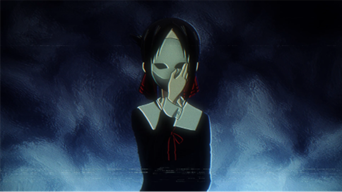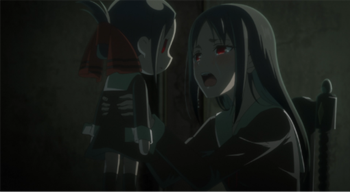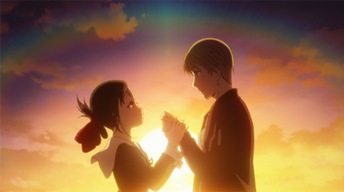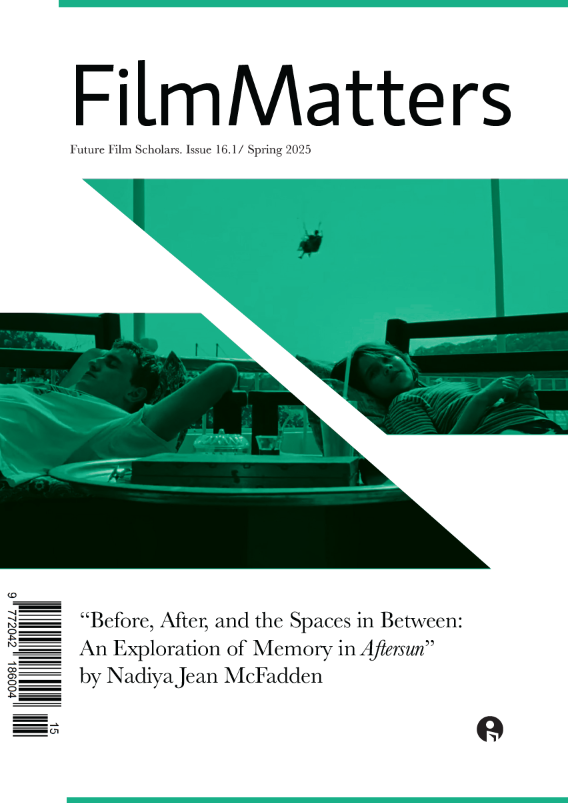
Kaguya-sama: Love Is War (Kaguya-sama wa Kokurasetai, Mamoru Hatakeyama, 2022) is a romantic comedy anime series about the student council president and vice-president, Shirogane and Kaguya, as well as the absolutely comedic romantic shenanigans between them. Despite both of them liking the other person, and knowing that they probably like them back too, they absolutely refuse to confess, and their war is to get the other person to confess to them (yes, it doesn’t make sense, and that’s intentional).
Though the three-season television series is full of moments for analysis, it is the succeeding film that pushes the story beyond the boundary of a teen romance drama. Despite the film being commonly perceived as an incredibly romantic anime, I believe it is revolutionary as it expertly explores the logic versus emotion theme using its in-depth, explicit, and multi-layered character exploration of Kaguya.
At the start of the film, Kaguya is mentally disturbed after kissing Shirogane at the end of the third season, as she has no idea what would happen now. This mental crisis significantly affects her and sees her reverts back to her cold and calculating personality before meeting Shirogane. The author Aka Akasaka uses the concept of persona in Carl Jung’s model of the psyche to explain how Kaguya developed this personality: She created a mask to adapt to her family’s strict upbringing, which taught her to never express excessive emotions, and to use, manipulate, and dispose people as needed. This persona was so deeply engrained in her that it became her main personality.
The film concretizes this abstract concept using Kaguya (Ice), a character appearing in her inner thoughts that represents this cold, calculating persona; it symbolizes the “extreme extent of Kaguya’s logical side” (Akasaka, Aka). On the other hand, Kaguya (Idiot) is another subconscious character that represents her caring, optimistic, and more emotional persona after meeting Shirogane and falling in love with him. These two characters symbolize the logic versus emotions theme that the film expertly explores. With the emotional persona named “Idiot,” the film implies that emotions are inferior, or at least is widely considered to be inferior, to logical thinking and calculation.
Yet the film proceeds to portray how detrimental it is for Kaguya to put up her Ice persona. She becomes highly toxic: she ignores Shirogane’s attempts to talk to her. She’s never straightforward about what she wants, forcing Shirogane to guess what she’s thinking. This causes Shirogane to have a mental break down, and with one final push of that toxicity, Shirogane collapses and has to be hospitalized. Kaguya (Ice) causes Shirogane to collapse, and Kaguya to cry for she is deeply pained after hurting Shirogane.

On the other hand, the conclusion of the film sees Kaguya (Idiot) taking over her and confesses to Shirogane, in an incredibly romantic scene that three seasons of anime and an entire film has built up to. The film hence incorporates and contrasts both personas of Kaguya in its major turning points: Kaguya (Ice) hurts both Shirogane and Kaguya, while Kaguya (Idiot) beings them utmost happiness. The film thus sends a strong message: that regardless of how highly regarded logical thinking is, ignoring our emotions in the process will be detrimental. We should strive to have a balance between logic and emotions in our thoughts and actions.
Kaguya-sama: Love Is War is not the only anime that explores the logic versus emotions theme. But what makes it stands out, and what makes it revolutionary for its romantic comedy gerne, is how in-depth and explicitly defined its character exploration is. It employs psychology theories to convincingly develop a multi-layered Kaguya with her multiple personas. And unlike many other romances, it gives this logic versus emotions theme the spotlight by making it highly central to the film. In addition, the character exploration is clear and explicitly defined through Kaguya’s personas, and is even concretizes through the two subconscious characters existing in Kaguya’s inner thoughts.
In-depth and explicit character exploration allows Kaguya to be more real and relatable to the viewers. We understand and care more about Kaguya, and thus care more about the themes and messages surrounding her. This is what makes the film revolutionary, as it’s able to send powerful messages to the viewers. In our frugal and material world, and in his Japanese society with alarming mental health issues, Akasaka hopes to bring attention to our usually neglected emotions and urge us to also take care of our emotional side.
Because it is only logical to do so.
References
Akasaka, Aka. “Kaguya Wants to Confide (Ice).” Kaguya-sama: Love Is War (Volume 15), Viz Media, 2020. (Manga Chapter)
Kaguya-sama: Love Is War – The First Kiss That Never Ends. Directed by Mamoru Hatakeyama, A-1 Pictures, 2022. (Main Film)
Author Biography
Minh Le is a Vietnamese first-year undergraduate student at Georgia Tech, majoring in Computer Science. As with the Computer Science stereotypes, he loves watching anime and reading manga. In particular, he enjoys series focusing on cute, sweet and funny moments, such as Kaguya-sama: Love Is War and The Angel Next Door Spoils Me Rotten.








































